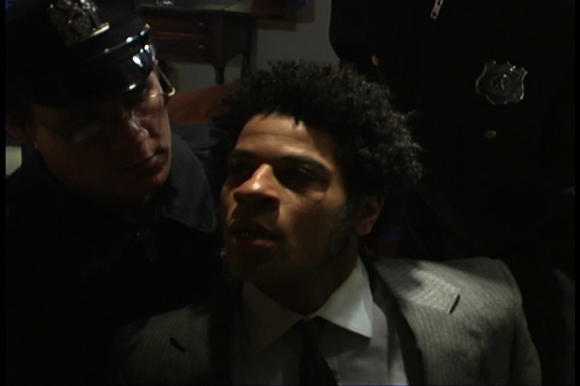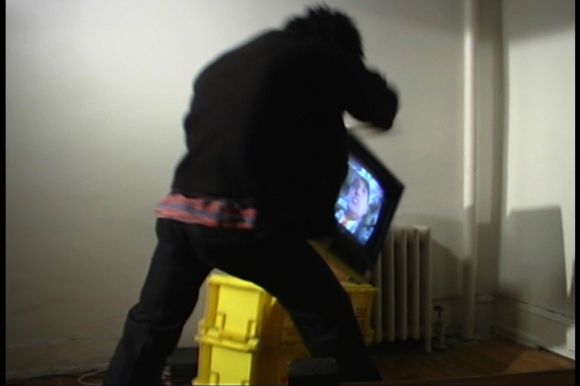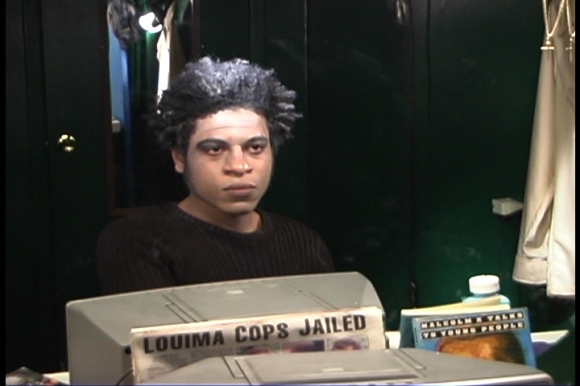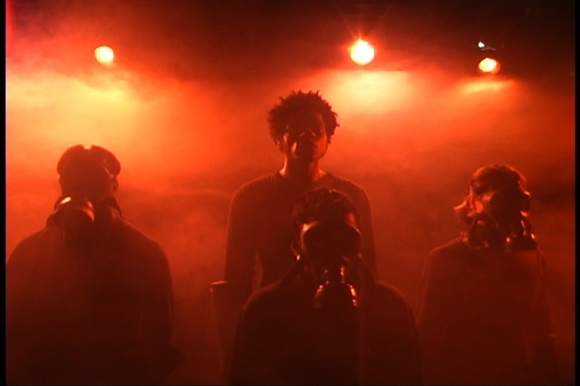“Raw, provocative, and demanding.”
Cara Buckley, The Miami Herald June 17, 2002
From gas masks/veins/
red, and stages.
Eyes/hands,
canted angles,
we’ve made the time & place to breathe in & breathe out…
— “the flickers on my wall” (2002)
A restored assembly of scenes has been uploaded and released on the web in an attempt to make parts of the film available to its cult fans and introduce it to a new generation as well. It has not been screened publicly in the USA since 2003 and the master tapes were destroyed by Kangalee while living in Europe. Renewed interest in the film came as a result of the publication of his poetry in 2010. Click here to go directly to clips, click on the stills, or simply continue reading below…
“While watching As an Act of Protest, as was true in a Cassavetes film, I felt as though the principal actors weren’t so much acting as they were pouring out before the camera, depictions of the way people really behave…it is in the scenes where Abner and Cairo discuss with each other, their rage as African American men, that the film is so compelling.”
– Hugh Pearson, author Shadow of a Panther: Huey Newton and the Price of Black Power in America

“…Through its frontal attack, it lets the audience seek solutions rather than presenting them as easy answers…The performances are solid–with the lead actors turning in gut-wrenching reality…It is so refreshing to see a movie that is raw, real–sweats–without glitzy effects or pabulum solutions.”
– Brent Buell, NY
Filmmaker/Author/Educator/Sing-Sing Prison Arts Instructor
http://www.imdb.com
*
AUTHOR’S STATEMENT
‘All I Wanted to Do Was Make a Cinematic Protest Poem’
By Dennis Leroy Kangalee

As an Act of Protest was the second greatest romance I have ever experienced.
It also nearly ended my life.
It was my greatest disaster, nearly ruined me in every way: professionally, creatively, socially, spiritually, psychologically, physically…Where some filmmakers end up emotionally — I started off. As an Act of Protest was a low point in my life and a peak artistically. It was the antidote that contained the poison. It was the culmination of my kamikaze-crash & burn-directing career (17-24) and my years as an actor. By the time I was 21 and full of vigor I was a gypsy — roaming from one theatrical boundary to another.
Disenchanted with the lack of spirituality, anarchy, consciousness, and creativity–I alienated my mainstream ‘mentors’ and gladly accepted the Juilliard School’s expulsion. Of course, an agent, representation, a manager — would have helped but it was at Juilliard that I realized who I was and what I most certainly was not going to be. Today, in my 30’s I haven’t the foggiest notion of who I am, but I still cling on to what I know I am not.
A robot is one of them.
A bootlicker is another.
Someone intent on “pleasing an audience” is somewhere on the list as well.
I went to Juilliard because I wasn’t accepted anywhere else and when I was 18 I still relished the idea of being a classical actor. However, as an actor, I rarely said the words I wanted to, expressed an aspect of myself, or addressed a feeling or idea that obsessed me. My problem was that I may have been perceived as a “natural performer” but cared more about how I felt as opposed to how the character felt or who he was. That is a huge problem for a traditional actor and it betrays the playwright. I found myself being attracted and influenced by more writers and musicians and painters as opposed to “actors.” I did, however, have a great love for the Living Theater and the Black Arts Movement, Circle Rep, Steppenwolf and a lot of the 1960’s-1970’s countercultural artistic movements. The problem was that by 1997, there was ONE culture: MAIN STREET. And the Internet Age quickly followed suit, arranging us all in the same line, the same row…so we all like everything.
I have always believed that every generation must fulfill its destiny or betray it, like Fanon said. We are responsible for expressing the torment and joy of our times.
I suppose it was a natural evolution to become a more creative artist as opposed to merely interpretive. And when of course I found the theater disenchanting, I realized I would have to start writing my own work. It was just a matter of time and building up the guts, having the courage to go at alone in a cage and beat the madness and honesty out of me. What did I want to say? Get it out!
The base of my art has always been as a writer. Someone who “makes up things” and expresses himself through those conceits. Tall tales. Big dreams. Strange fantasies. I’ve always written, I’ve always told stories. Some were real, some weren’t. But all were true. And the best ones are always sincere. Racism is something I have never had any tolerance for and I have a low threshold for it, lower than most people. It makes my blood boil and I knew I had to write something sincere– directly — like a rap song — about what was bothering me.
All I wanted to do was make a cinematic protest poem.
Anna Freud once wrote “If I prick you and you do not say ouch, something is wrong with you.” I can’t remember where I read that — but that sharp statement has always resonated with me. I wanted to make a film that was less a “movie” and more like a poem or more akin to an album, a collection of protest songs. Having been influenced early on from artists such as Phil Ochs, early Dylan, Bertolt Brecht, James Baldwin, LeRoi Jones/Amiri Baraka — it only seemed natural that my political inclinations, my disapproval and anger in how we live and die in our society — would inform my art. My early directing projects were perhaps too heavy-handed, but I would never say they eschewed artistic consideration. Sure, some of it may have been provocative — but an arresting image does well when it reveals something deeper. When the soul lunges and the heart coils and the blood beats in your temple — you know it is visceral and it is real. It is love. It is rock and roll. It is dance. It is celebration. It is freedom.
I wanted to make a movie that sprang across the jungle-gym of my mind. I wanted to cast a net over the mania of my fervor, my discontent with our status quo, my acceptance of a racist world and an oppressive society. I wanted to do it with personal and colorful characters, people who were real to me, or were parts of me — and I wanted to let it rip. And I did, almost to my own detriment. But you can never be too personal. If anything is special about Protest — it is that it’s one of the few movies whose main characters actually feel and believe everything they’re saying. Singers are liable to get stomped on when they sing words they don’t believe. Despite its fictitious grandeur, it should be no different for the actor!
It was important to express the angst of the aftermath of the Amadou Diallo murder and I wanted to put my anger to use. I did not pick up a gun. I did not burn down a village. I did not smash windows. I wrote a script and a kind of spiritual autobiography of who I was at the time. It may have been a cop out – but it was a beautiful one.
The movie took a year to make. I spent a month shooting and nearly eight months editing. I finished the first cut days before 9/11, I was out on North 7th in Williamsburg where my editor lived and I remember walking all the way down to Bedford avenue each night to the L train and not seeing a soul in sight . And it was beautiful. I could re-cut and play out scenes in my head and not be distracted, disturbed, or annoyed by anyone with a latte or a carpool or fleet of backpacks. I was also abusing a great deal of drugs, which I do not recommend for any filmmaker. When you’re coked up, it’s not that you lose perspective or nuance or any of those other bourgeois attributes — it is that your work suffers in its expression. And what you think you are saying/feeling is actually something else. You become convoluted. Which is not at all a negative thing, but it gets in the way when you don’t trust your audience.
I have always had contempt for people who need to be shown or entertained or “explained” to. It probably comes from the fact that I myself had so many learning disabilities and academic problems at school…
Four months after the first cut of Protest, I went home to my apartment on 131st street between Malcolm X & 5th Ave; swallowed every pill I had in my bathroom, ingested as much cocaine as I possibly could, dressed in the best suit I had, lay down and waited for God (or someone) to shut my eyes.
I woke up three days later in Harlem Hospital with my entire family hovering over me. To this day, I still think about the fact that I was in that hellhole asylum for one month and no one even sent me a flower…
I tried to kill myself not just because I was tired of living, but mainly because I knew I had failed as an artist. I knew Protest was not the film it could have been, but then again — I am not the artist I “could” have been — so what does that mean? It is in the accepting of your limitations as an artist that you grow. It is, for better or for worse, what defines your work. It’s what you don’t do “well” that becomes your identity and this is where you must wear your genuine attempts as a badge of courage. Especially if those attempts fall short.
“Powerful…As an Act of Protest aims to teach and shock – and succeeds on both counts.”
Walter Dawkins
Variety, August 1, 2002
Orson Welles said a successful work of art is a piece that expresses the personality of its creator. I agree and yet I cannot watch As an Act of Protest without cringing. It is a young man’s movie, a murky coming-of-age-story and it is riddled with a rawness that is like an exposed nerve. Yet the fragmented, over-anxiousness of the movie is what I am most proud of, along with its unfettered rage. Just a scene or two rejuvenates my rebellious sensibilities — the way I felt when I first saw Network, Talk Radio, Animal Crackers, Dog Day Afternoon, Shadows, Woman Under the Influence or Ludwig or Chameleon Street or The Devil Probably, Ganja & Hess, Dr Strangelove, Sweet Sweetback’s Badass Song, Ashes & Embers, or Bush Mama. These films were like hard-core punk albums. They didn’t hold back and they had something to say. And I loved how most of them employed great amounts of drama and comedy and blurred the division. I wanted to make a film that felt like the Clash or Public Enemy could have made it had they been dramatists instead of musicians.
For all my “in-your-face” radical proclivities, it was the subtle and stately dismay of Bill Gunn, Sokurov, Bresson, Dreyer, Ozu, and Sembene that taught me a lot about stasis and inducing a state of grace and how to find the poetry in my own vision as a director. And I must tip my hat to Robert Kramer, the American Left’s great un-sung hero of cinema. Kramer gave me the freedom to simply “come out of the closet” and be me and not be afraid to express that on camera.
I lack the finesse of these great artists and movies mentioned above, but the writer must write what he knows and write what he feels. He must start there and go onward, and then you find yourself scrambling, lost, explored unmapped territory and really getting into the bush of it all. I know about truth because I know about lies. And I preach because I’m convinced that sooner or later — I will actually become a better human being, too. But mainly I do it because most artists are too effete, kind, and pander to what they have been led to believe that the masses want.
I may have been born to rage, to raise hell. Some of us are. But the art of it all is knowing how to push it, when to kick it, where to throw it.
And sometimes…when to jump off the edge. If there is no progress without struggle, there can be no evolution without contemplation, resolution without conflict, and consciousness…without rage.
So, this damn movie got me through my twenties and nearly killed me. I spent I spent the first half of my thirties crawling back out of the grave I had dug for myself. And although I’m rusty, not as polished — what I say comes through as clearly as the debt we are incurring and I no longer dwell how I am going to express the scream in my head. I just do it. And I thank God (or someone, or some thing) that I can.
There are no existing tapes or copies of Protest available. There are several butchered copies and bootlegs circulating, but none with my original edits, glitches, fingerprints, stains, or blessing. And in a bi-polaroidic episode, I threw the masters over the terrace, into the street in Berlin while we were living on the top floor of a Five-story walk up in Wedding. 22 Lohmeyerstrasse, to be exact. The tapes shattered into the air as they cascaded into the sidewalk, barely missing a parked car. Nina warned me I would regret it. I can only say I regret it now that people have written asking for copies and have taken a new interest in the film. The cast, the backers, the crew — they all hated it, no one helped me promote it. Che Ayende who plays the lead later conceded that it was a remarkable picture and the best thing he’s ever done. But initially, people were jealous, strange, scared, suspicious, offended. Some thought I was Spike Lee on acid. There were all sorts of reasons why the film “failed.” But I take responsibility as I am its father.
But despite the misunderstandings and the lack of patience some had with the film, I love the damn thing because it tried. It did the best it could do — with its allotment of talent, faith, and resilience. We are all responsible for our own failure and our own success. This desperate video taught me, gave me, showed me both sides of this coin. And I am much deeper and richer for having undergone such a traumatic experience — but one that was, in the very least, sincere.
It has been nice to revisit some of these feelings. Thanks for reading. [December, 2008]
Film History:
• Pan African Film Festival, Los Angeles 2002
• American Black Film Festival, South Beach Miami 2002
• Anthology Film Archives, NYC – 2002
• Brecht Forum-Visual Liberation Film festival, NYC – September 2002
• Imagenation Cinema Cafe, Harlem NYC – Nov, 2002
• Afro-American Cultural Center, Charlotte, North Carolina 2003
• UNC, Chapel Hill Honorarium Screening – February 2003
• FESPACO Film Festival Burkina Faso, Africa February 2003
• The Oberia Dempsey Center Harlem 2003
• Cine Noir Black Film Festival, Wilmington NC April 2003
• Denver Pan African Film Festival, Denver, CO – April 2003
• Parish Art Gallery -sponsored by Awareness magazine, July 2003
• Florida State University-Tallahassee Honorarium Screening 2004
• Brecht Forum Downtown – Lower Manhattan NYC – August 2005
• Black International Cinema Festival, St.Louis, MO 2005
• Paris, France & Berlin, Germany 2005-2006
Set at the turn of the 21st century in NYC — just months before 9/11 –The film reveals the “rite-of-passage-stations-of-the-cross” journey of a young, passionate, African American actor named Cairo Medina.

Cairo begins to question his role as an actor and artists’ seemingly futile contributions and dwindling impact in an increasingly oppressive, hypocritical, and apathetic world. After a series of dissolved relationships, betrayals, and confrontations with the system,
Cairo is pushed over the line from which there can be no retreat.
The film ends tragically with a comment on racism and the violence that it breeds and the unfortunate, never ending cycle of hate, prejudice, and ignorance of history and “original sin” that America must come to terms.
“As an Act of Protest – Best Black Movie Nobody Will See This Year.”
– Kam Williams
The Black World Today & The NJ Herald, Nov. 27, 2002
*
to request a copy of As an Act of Protest, contact outsiderartkangalee@gmail.com

[…] and Vagabond; he spent a whole year restoring and re-contextualizing my 2001 controversial drama As an Act of Protest — granting it new fresh screenings, introducing it to a whole new generation and enabling the […]
[…] first met Dennis Leroy Kangalee around 20001, when he had finished his feature film AS AN ACT OF PROTEST, a 3rd Cinema tone poem on racism, police brutality and state abuse during the mayoral era of Rudy […]